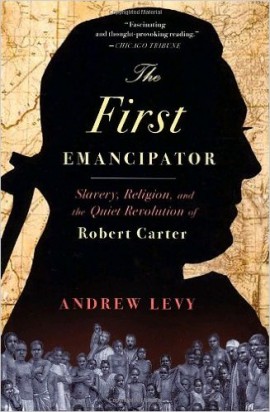August 2016: Who Was “The First Emancipator”?
 We know that Abraham Lincoln — as well as several of the Founding Fathers — wanted to abolish slavery in the United States. But long before the Civil War, one man broke with his peers by arranging the freedom of his nearly 500 slaves.
We know that Abraham Lincoln — as well as several of the Founding Fathers — wanted to abolish slavery in the United States. But long before the Civil War, one man broke with his peers by arranging the freedom of his nearly 500 slaves.
His name was Robert Carter III, and on Sept. 5, 1791, this pillar of Virginia’s Colonial aristocracy wrote the “deed of gift.” This signed document voluntarily and without recompense transferred ownership from his possession to the men and women who had been his slaves.
Yet, despite Carter’s courageous move — or perhaps because of it — his name has all but vanished from the annals of American history, according to Andrew Levy, author of The First Emancipator, which explores the confluence of circumstance, conviction, war, and emotion that led to Carter’s extraordinary act.
As Levy points out, “Carter was not the only humane master, nor the sole partisan of emancipation, in that freedom-loving age. So why did he dare to do what other visionary slave owners only dreamed of?”
Scroll down for our Q&A with the author, who is also the Edna Cooper Chair in English at Butler University in Indianapolis, IN. — David Bruce Smith, founder, and Hope Katz Gibbs, executive producer, The Grateful American™ Foundation • Grateful American™ Kids



